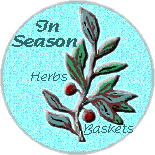
Winter | Spring | Summer | Fall | Holiday
Baskets | Community
Herbs and Baskets
summer
How to make Herb Vinegar
Making herb vinegars is easy and rewarding. The colors are lovely, the taste is delicious and the process is satisfying.Some general guidelines:
Cut herbs in the morning, if possible, after the dew has dried but before it gets hot. The essential oils will release from the herbs at about 85 degrees F.
Never put your vinegar in a container whose previous contents are unknown to you. It is not a good idea to buy bottles for vinegar at flea markets or yard sales.
Check the vinegar you are going to use for acidity. Any vinegar with 5% acidity can be used to make herb vinegar.
Basic directions:
- Sterilize pint or quart jars.
- Gather fresh herbs. Wash and pat dry herbs.
- Put herbs in sterilized jar. Remember, you can always dilute the vinegar if the herb flavor is too strong; you cannot easily strengthen the herb flavor if it is too weak.
- Add vinegar to cover the herbs. Do not heat the vinegar; use it at room temperature.
- Put a non-metallic lid on jar and store in cool, dark place for 2-4 weeks. Check it after 2 weeks for flavor and aroma.
- When the vinegar has reached the desired flavor, strain it to remove the old herbs.
- Place one or two fresh herb stems in a sterile bottle. Pour in strained herb vinegar and seal. The new herbs are primarily for decoration.
- Label vinegar. Enjoy.
Selecting a vinegar:
The most commonly used vinegars are red or white wine vinegars and cidar vinegars. Rice wine vinegar, sherry vinegar and other specialty vinegars may also be used. Distilled white vinegar is easy to obtain and will make a nice herb vinegar, but it will have a sharper flavor than the wine vinegars.
- Select a white vinegar if the herb will color the vinegar.
- Use a red vinegar if the herb has a strong flavor.
Some favorite combinations:
- Chive blossoms and white wine vinegar.
The chive blossoms give the vinegar a lovely pink color and light onion taste. - Lavendar blossoms and cidar vinegar.
This is truly special. It is almost effervescent. - Basil, oregano and thyme in a red wine vinegar.
A rich, full flavor that is excellent in salad dressings and marinades. - Rosemary in a white vinegar.
This makes a nice hair rinse after a permanent. It removes the "skunky" scent of the perm. It can also substitute for a mouth rinse in an emergency.
Experiment. Use the herbs you enjoy. Be generous in the amout of herbs you use to make the vinegar. It is hard to have anything but success in making herb vinegars.
prev next
|
Site design, and webmastery by Cicada Consulting Group
Copyright © In Season Herbs and Basketsc 1997 All rights reserved. |
Page refreshed: Sat, Feb 23, 2002
http://www.inseason.com/summer/vinegar.html |